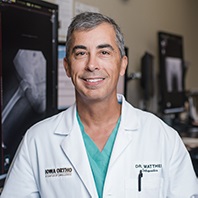
If you’ve been told that you need a knee replacement, you’re probably wondering, “What is the recovery going to be like?” It’s completely natural to feel anxious before surgery. At Iowa Ortho, we’re committed to making your total knee replacement recovery as smooth and manageable as possible.
Early Movement After Surgery: Why It’s Important
Dr. Mark Matthes, an orthopedic expert at Iowa Ortho, emphasizes the importance of getting up and walking soon after surgery. Yes, you’ll be able to walk, fully weight-bearing, with an assistive device (like a walker) right after your procedure. This early movement helps prevent complications such as blood clots, swelling, and stiffness. It also plays a key role in strengthening the muscles around your knee, which is vital for a successful recovery.
A technique that Dr. Matthes uses during total knee replacement surgery is spinal anesthesia, which differs from general anesthesia. By opting for spinal anesthesia, patients often experience less grogginess, allowing them to get moving more quickly after surgery.
Managing Pain After Knee Replacement Surgery
Pain management is a common concern for many patients, but Dr. Matthes explains that Iowa Ortho uses a multi-modal pain control approach to ensure a comfortable recovery. This approach combines several treatments and medications before, during, and after surgery to provide effective pain relief with reduced reliance on strong narcotic medications.
The multi-modal approach includes:
- Non-narcotic pain medications
- Anti-inflammatories
- Nerve pain inhibitors
- Cold therapy
- A short course of steroids
- Local anesthetics administered during surgery
Additionally, long-acting nerve blocks can be used to manage post-operative pain and reduce the need for narcotics during the first 24 hours after surgery.
How Long Will You Stay in the Hospital?
A major advancement in knee replacement surgery is the significantly reduced hospital stay. While recovery time can vary, most patients undergo knee replacement as an outpatient procedure and are able to go home the same day, with the majority of surgeries performed at Iowa Ortho’s River Hills Surgery Center for a smooth and efficient recovery.
Your Path to Recovery: Physical Therapy and What to Expect
Your recovery doesn’t stop when you go home. To regain full strength and mobility, you’ll work with a physical therapist who will guide you through exercises designed to get your knee moving and the surrounding muscles stronger. Before your surgery, you’ll go through a physical therapy pre-screening, and in the weeks and days leading up to your surgery, you’ll receive helpful informational emails to prepare you for what’s ahead. On the day of your surgery, you’ll also see a physical therapist before you’re discharged from the surgery center to ensure that you can return home safely.
It’s essential to attend all physical therapy appointments and follow through with exercises at home. On average, patients use an assistive device for walking for 4-8 weeks after surgery. The good news is that with consistent effort, most people experience significant improvement in mobility and pain reduction during this time.
RICE: Essential for At-Home Recovery
To promote healing at home, don’t forget about the RICE method:
- R: Rest
- I: Ice
- C: Compression
- E: Elevation
Following these steps will help reduce swelling and support your recovery process.
How Long Is the Full Recovery Time?
While the recovery timeline varies from person to person, most patients find that their total knee replacement recovery takes around six months. However, it may take up to a year to fully return to high-impact activities.
Take the First Step Towards Pain Relief
If you’re experiencing debilitating knee pain or have been advised to undergo a knee replacement, the team at Iowa Ortho is here to help. Our experts are dedicated to providing comprehensive care that helps you recover as quickly and comfortably as possible.
